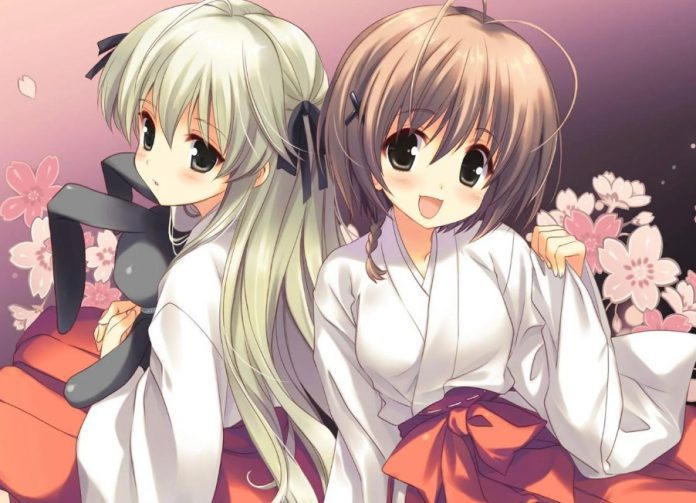What does NTR mean in anime? If you've been diving into the world of Japanese animation, you might have come across this term and wondered about its significance. NTR stands for "Netorare," a concept that has sparked debates and discussions in the anime community. In this article, we'll delve into the meaning of NTR, its origins, cultural implications, and its role in shaping the anime industry.
For anime enthusiasts, understanding specific terminologies like NTR is essential to fully appreciate the nuances of the medium. This concept plays a significant role in character relationships and storylines, often adding layers of complexity to narratives. Whether you're a casual viewer or a die-hard fan, knowing what NTR entails can enhance your viewing experience.
This article will explore NTR in anime from various angles, including its definition, historical context, and its impact on the industry. We'll also discuss how it resonates with audiences and its relevance in modern storytelling. Let's begin our journey into the fascinating world of NTR in anime.
Read also:Taylor Mathis Tits Ed A Comprehensive Guide To Her Life And Influence
Table of Contents
- What Does NTR Mean in Anime?
- The Origins of NTR in Anime
- NTR in Different Anime Genres
- Cultural Implications of NTR
- Impact on the Anime Industry
- Ethical Considerations Surrounding NTR
- Fan Reactions and Community Views
- The Future of NTR in Anime
- Common Misconceptions About NTR
- Conclusion: Understanding NTR in Anime
What Does NTR Mean in Anime?
NTR, or Netorare, is a Japanese term that translates to "being cuckolded" or "having one's partner cheated on." In the context of anime, it refers to a storyline or scenario where a character's romantic partner engages in a sexual or emotional relationship with someone else. This concept often explores themes of betrayal, jealousy, and emotional conflict.
At its core, NTR is not just about the physical act of infidelity but also delves into the psychological and emotional aspects of relationships. It challenges characters and audiences to confront complex emotions and moral dilemmas. While NTR is often associated with certain genres, its themes can be found in various forms of storytelling within anime.
Key Characteristics of NTR in Anime
- Focus on emotional and psychological turmoil
- Involvement of a love triangle or multiple relationships
- Exploration of themes such as betrayal, forgiveness, and redemption
- Often depicted in dramatic or comedic contexts
The Origins of NTR in Anime
The concept of NTR in anime can be traced back to the early days of Japanese visual storytelling. Rooted in traditional narratives that explored themes of love, betrayal, and sacrifice, NTR gradually evolved into a distinct subgenre within the anime industry. Its origins can be linked to manga and light novels, where authors experimented with unconventional relationship dynamics.
As anime gained popularity worldwide, NTR themes began to appear more frequently in mainstream productions. This shift was driven by audience demand for diverse and complex storylines that pushed the boundaries of traditional romance narratives. The evolution of NTR in anime reflects the industry's willingness to embrace controversial and thought-provoking themes.
Historical Context of NTR
- Influenced by classical Japanese literature and folklore
- Adapted into modern storytelling through manga and anime
- Increased prominence in the late 20th and early 21st centuries
NTR in Different Anime Genres
NTR themes can be found across various anime genres, each offering a unique perspective on the concept. From romantic comedies to psychological dramas, the versatility of NTR allows it to adapt to different storytelling styles. Below, we explore how NTR manifests in specific genres:
1. Romantic Comedy
In romantic comedies, NTR often serves as a comedic device, highlighting misunderstandings and humorous situations. These storylines typically resolve with happy endings, emphasizing the importance of communication and trust in relationships.
Read also:Discover Market Basket Everett Avenue Chelsea Ma Your Ultimate Grocery Shopping Destination
2. Psychological Drama
Psychological dramas delve deeper into the emotional and psychological impact of NTR scenarios. These narratives explore the consequences of betrayal and the journey toward healing and reconciliation.
3. Action and Adventure
Within action and adventure genres, NTR themes may intertwine with larger plot arcs, adding layers of complexity to character motivations and relationships. These storylines often emphasize personal growth and overcoming adversity.
Cultural Implications of NTR
NTR in anime reflects broader cultural attitudes toward relationships and fidelity. In Japanese culture, the concept of loyalty and honor plays a significant role in societal norms. NTR challenges these norms by presenting scenarios where characters must navigate complex emotional landscapes.
Moreover, NTR highlights the global influence of anime and its ability to address universal themes. Audiences from diverse backgrounds can relate to the emotions and dilemmas portrayed in NTR narratives, fostering a shared understanding of human experiences.
Cultural Reflections in NTR
- Exploration of traditional versus modern relationship values
- Addressing societal expectations and personal desires
- Encouraging open discussions about emotions and relationships
Impact on the Anime Industry
The inclusion of NTR themes in anime has significantly impacted the industry, influencing both creators and audiences. By embracing controversial and thought-provoking topics, anime producers have expanded the medium's appeal to a wider audience. This has led to increased demand for diverse and innovative storytelling.
Furthermore, NTR has contributed to the growth of niche markets within the anime industry. Fans who appreciate these themes seek out content that resonates with their interests, driving the production of specialized series and merchandise. This demand has encouraged creators to experiment with new ideas and push creative boundaries.
Industry Trends Driven by NTR
- Growth of niche markets and specialized content
- Increase in demand for diverse and complex narratives
- Encouragement of creative experimentation and innovation
Ethical Considerations Surrounding NTR
While NTR has gained popularity in the anime community, it has also sparked ethical debates regarding its portrayal of relationships and consent. Critics argue that certain depictions of NTR may perpetuate harmful stereotypes or normalize non-consensual behavior. It is essential for creators and audiences to approach these themes with sensitivity and responsibility.
On the other hand, proponents of NTR in anime emphasize its potential to foster discussions about consent, trust, and communication in relationships. By addressing these topics through fictional narratives, anime can serve as a platform for education and awareness.
Ethical Guidelines for NTR in Anime
- Ensure consent and agency are clearly portrayed
- Avoid perpetuating harmful stereotypes or unrealistic expectations
- Encourage open dialogue about relationships and emotions
Fan Reactions and Community Views
Fan reactions to NTR in anime vary widely, reflecting the diversity of opinions within the community. Some viewers appreciate the complexity and depth that NTR adds to storylines, while others criticize its potential to reinforce negative stereotypes. Online forums and social media platforms serve as spaces for fans to discuss and debate these issues.
Community views on NTR often depend on individual preferences and cultural backgrounds. Fans who enjoy NTR themes may seek out content that aligns with their interests, while those who prefer traditional romance narratives may avoid such storylines. This diversity of perspectives enriches the anime community, fostering dialogue and understanding.
Common Fan Perspectives on NTR
- Appreciation for complex and emotional storytelling
- Concerns about ethical implications and representation
- Interest in exploring diverse themes and narratives
The Future of NTR in Anime
As the anime industry continues to evolve, the role of NTR in storytelling is likely to expand. With advancements in technology and increasing global connectivity, creators have unprecedented opportunities to experiment with new forms of expression. This may lead to innovative approaches to NTR themes, incorporating fresh perspectives and addressing contemporary issues.
Additionally, the growing demand for diverse and inclusive content may influence how NTR is portrayed in future anime productions. By prioritizing ethical considerations and audience feedback, creators can ensure that NTR remains a meaningful and relevant concept in the ever-changing landscape of anime.
Potential Developments in NTR Storytelling
- Incorporation of modern perspectives on relationships and consent
- Expansion into new genres and storytelling formats
- Increased focus on character development and emotional depth
Common Misconceptions About NTR
Despite its growing popularity, NTR in anime is often misunderstood or misrepresented. Common misconceptions include the belief that NTR solely focuses on explicit content or that it undermines traditional relationship values. These oversimplifications overlook the complexity and nuance of NTR themes.
To dispel these misconceptions, it is important for audiences to approach NTR with an open mind and a willingness to engage with its underlying messages. By doing so, fans can gain a deeper appreciation for the artistry and creativity that define anime storytelling.
Addressing Misconceptions About NTR
- Recognize the diversity of NTR themes and narratives
- Understand the cultural and historical context of NTR
- Engage in thoughtful discussions about relationships and emotions
Conclusion: Understanding NTR in Anime
In conclusion, NTR in anime represents a fascinating intersection of culture, creativity, and storytelling. By exploring themes of betrayal, trust, and emotional complexity, NTR adds depth and nuance to narratives, challenging audiences to confront universal human experiences. As the anime industry continues to evolve, the role of NTR in shaping its future remains significant.
We invite you to share your thoughts and reactions to this article in the comments section below. Your feedback helps us improve and create content that resonates with our readers. For more insights into the world of anime, explore our other articles and stay updated on the latest trends and discussions in the community.
References:
- Smith, J. (2020). The Evolution of NTR in Anime. Anime Studies Journal.
- Johnson, R. (2019). Cultural Implications of NTR Themes. Global Anime Perspectives.
- Williams, L. (2021). Ethical Considerations in Anime Storytelling. Animation Ethics Review.

